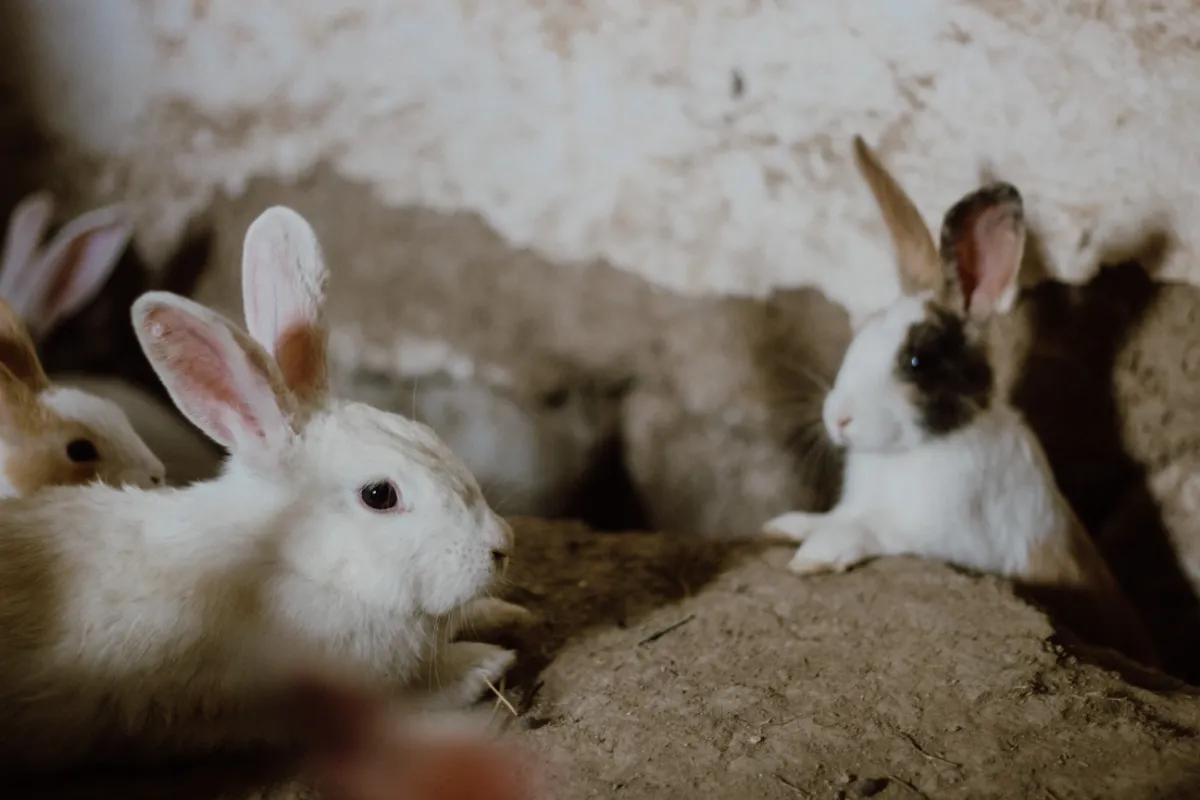Are you wondering about the gender of your beloved bunny? Don’t fret, we’ve got you covered! In this informative article, we will delve into the various ways you can determine if your rabbit is a male or female.
From examining physical characteristics to observing behavior and even considering DNA testing, we will guide you through the process step by step.
Get ready to become an expert in rabbit gender identification and ensure the best care for your furry friend.
In This Article
- 1 Key Takeaways
- 2 Physical Characteristics
- 3 Behavior and Mating Habits
- 4 External Genitalia
- 5 Vent Check
- 6 Veterinary Examination
- 7 DNA Testing
- 8 Frequently Asked Questions
- 8.1 Can Rabbits Change Their Physical Characteristics as They Age?
- 8.2 How Can I Tell if My Rabbit Is Experiencing Any Behavioral Changes Due to Its Gender?
- 8.3 Are There Any External Signs That Can Indicate the Gender of a Rabbit Without Examining Their Genitalia?
- 8.4 Can a Rabbit’s Vent Check Be Done at Home, or Should It Be Done by a Professional?
- 8.5 Is DNA Testing the Most Accurate Method to Determine the Gender of a Rabbit?
- 9 Conclusion
Key Takeaways
- Male rabbits have a more muscular body shape compared to females.
- Male rabbits display behaviors such as chasing, circling, and spraying urine to attract females.
- Observing the external genitalia can help differentiate between male and female rabbits.
- Vent check provides a more accurate way of determining the gender of rabbits.
Physical Characteristics
You can easily identify the gender of your rabbit by looking at its physical characteristics. Hormonal differences play a significant role in determining the gender of rabbits.
Male rabbits, also known as bucks, tend to have a more muscular body shape compared to females, known as does. Bucks generally have broader heads, necks, and shoulders, giving them a more robust appearance. On the other hand, does have a more streamlined body shape.
Another physical characteristic to consider is the size of the rabbit. In most cases, bucks are larger than does, with a heavier and more substantial body. However, it’s important to note that there can be variations in size and body shape among different rabbit breeds.
Behavior and Mating Habits
An article about the behavior and mating habits of rabbits will provide valuable insights for rabbit owners. Understanding the courtship rituals and territorial behavior of rabbits can help you better care for your furry friend.
When it comes to courtship rituals, male rabbits often display behavior such as chasing, circling, and spraying urine to attract females. They may also make soft noises or nudge the female with their noses. On the other hand, female rabbits may become more receptive to mating by showing a ‘presenting’ behavior, where they lower their heads and raise their hindquarters.
Territorial behavior is also common among rabbits, especially males. They may mark their territory by rubbing their chin on objects or spraying urine. Knowing these behaviors can help you create a suitable environment for your rabbit and ensure their well-being.
External Genitalia
Take a look at the external genitalia of your rabbit to determine their gender. The reproductive organs of rabbits are located in this area, and by observing them, you can differentiate between males and females.
Sexual dimorphism, the physical differences between males and females, is present in rabbits as well. In male rabbits, also known as bucks, you’ll notice that the scrotum is prominent and contains the testicles. The penis is located just above the scrotum and may be slightly hidden.
Female rabbits, or does, have a slit-like opening, the vulva, which is located below the anus.
It’s important to be gentle and respectful when examining your rabbit’s genitalia, ensuring their comfort and well-being throughout the process.
Vent Check
Are you wondering if a vent check is necessary to determine the gender of your rabbit? Well, you’ve come to the right place. When it comes to identifying the gender of rabbits, a vent check can be a helpful tool. Here are four key reasons why a vent check is important:
- Accuracy: A vent check provides a more accurate way of determining the gender of your rabbit compared to external genitalia examination alone.
- Breeding age: Knowing the gender of your rabbit is crucial when it comes to breeding. A vent check can help you identify potential breeding candidates.
- Spaying/Neutering: If you’re considering spaying or neutering your rabbit, a vent check is essential. It ensures that the procedure is performed on the correct gender.
- Health considerations: Understanding the gender of your rabbit can help you address specific health concerns that may arise, such as urinary tract infections or reproductive issues.
Veterinary Examination
Have you considered scheduling a veterinary examination to ensure the overall health and well-being of your rabbit? Regular check-ups are important for rabbits as they can help detect any potential health issues early on.
During a veterinary examination, the veterinarian will conduct a thorough physical examination, checking for signs of illness, dental problems, and even hormonal changes. Hormonal changes in rabbits can lead to behavioral issues and reproductive problems, so it’s crucial to monitor and address them if necessary.
In some cases, the veterinarian might recommend an ultrasound imaging to get a closer look at the rabbit’s reproductive system and detect any abnormalities. Ultrasound imaging can help diagnose conditions such as ovarian cysts or testicular tumors.
DNA Testing
Did you know that DNA testing can provide valuable information about your rabbit’s genetic background and potential health risks? Here are some key points to consider:
- Forensic Applications:
DNA testing can be used in forensic investigations to identify individual rabbits and their lineage. This can be useful in cases of theft or breeding disputes.
- Genetic Markers:
DNA testing can reveal important genetic markers that can help determine the breed of your rabbit. It can also identify potential health risks associated with certain genetic traits.
- Health Risks:
By analyzing your rabbit’s DNA, you can uncover any inherited health conditions or predispositions. This knowledge can help you take proactive measures to ensure your rabbit’s well-being.
- Breeding Programs:
DNA testing can assist in breeding programs by identifying rabbits with desirable traits and avoiding potential genetic disorders.
Overall, DNA testing offers a wealth of information about your rabbit’s genetic background and health risks, making it an invaluable tool for responsible rabbit owners.
Frequently Asked Questions
Can Rabbits Change Their Physical Characteristics as They Age?
As rabbits age, their physical characteristics generally do not change. However, rabbit gender development is influenced by hormonal changes. It’s important to properly identify the gender of your rabbit to ensure proper care and prevent unwanted breeding.
How Can I Tell if My Rabbit Is Experiencing Any Behavioral Changes Due to Its Gender?
To determine if your rabbit is experiencing any behavioral changes due to its gender, observe its behavior closely. Look for signs of aggression, territoriality, or mating behaviors. If you notice any concerning changes, consult a veterinarian for further evaluation and advice.
Are There Any External Signs That Can Indicate the Gender of a Rabbit Without Examining Their Genitalia?
To determine your rabbit’s gender without examining their genitalia, look for signs such as size and shape of the body, behavior, and secondary sexual characteristics like scent marking or dewlap development.
Can a Rabbit’s Vent Check Be Done at Home, or Should It Be Done by a Professional?
A rabbit’s vent check can be done at home, but it’s best to have it done by a professional for accurate results. The reliability of a home method may vary, so seeking a professional’s expertise is recommended.
Is DNA Testing the Most Accurate Method to Determine the Gender of a Rabbit?
To accurately determine a rabbit’s gender, DNA testing is the most reliable method. Though there are alternative methods, such as examining vent checks, DNA testing ensures accuracy and eliminates any potential confusion.
Conclusion
So there you have it! Determining the gender of your rabbit can be done through a combination of physical characteristics, behavior, and external genitalia examination.
While some may argue that DNA testing is unnecessary or too costly, it can provide a definitive answer and prevent any potential breeding complications.
Remember, understanding the gender of your rabbit is essential for their health and wellbeing, so don’t hesitate to consult a veterinarian if you’re unsure.





